
Andhra Pradesh is a state in the southern coastal region of India. It is the seventh-largest state with an area of 162,970 km2 (62,920 sq mi) and tenth-most-populous state, with 49,577,103 inhabitants. It has shared borders with Telangana, Chhattisgarh, Odisha, Tamil Nadu, Karnataka, and the Bay of Bengal. It has the second-longest coastline in India of about 974 km (605 mi). After existence as Andhra state and unified Andhra Pradesh, the state took its present form on 2 June 2014, when the new state Telangana was formed through bifurcation. Amaravati serves as the capital of the state with the largest city being Visakhapatnam. Water sharing disputes and assets division with Telangana are not yet resolved. Telugu, one of the classical languages of India used by the majority of people, is the first official language.

India, officially the Republic of India, is a country in South Asia. It is the seventh-largest country by area; the most populous country as of June 2023; and from the time of its independence in 1947, the world's most populous democracy. Bounded by the Indian Ocean on the south, the Arabian Sea on the southwest, and the Bay of Bengal on the southeast, it shares land borders with Pakistan to the west; China, Nepal, and Bhutan to the north; and Bangladesh and Myanmar to the east. In the Indian Ocean, India is in the vicinity of Sri Lanka and the Maldives; its Andaman and Nicobar Islands share a maritime border with Thailand, Myanmar, and Indonesia.

Karnataka, formerly Mysore State, is a state in the southwestern region of India. It was formed as Mysore State on 1 November 1956, with the passage of the States Reorganisation Act, and renamed Karnataka in 1973. The state was part of the Carnatic region in British terminology. Its capital and largest city is Bengaluru (Bangalore).
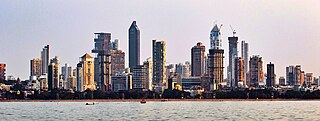
Mumbai is the capital city of the Indian state of Maharashtra. Mumbai is the de facto financial centre and the most populous city of India with an estimated city proper population of 12.5 million (1.25 crore). Mumbai is the centre of the Mumbai Metropolitan Region, the sixth most populous metropolitan area in the world with a population of over 23 million living under the Brihanmumbai Municipal Corporation. Mumbai lies on the Konkan coast on the west coast of India and has a deep natural harbour. In 2008, Mumbai was named an alpha world city.

West Bengal is a state in the eastern portion of India. It is situated along the Bay of Bengal, along with a population of over 91 million inhabitants within an area of 88,752 km2 (34,267 sq mi) as of 2011. The population estimate as of 2023 is 102,552,787. West Bengal is the fourth-most populous and thirteenth-largest state by area in India, as well as the eighth-most populous country subdivision of the world. As a part of the Bengal region of the Indian subcontinent, it borders Bangladesh in the east, and Nepal and Bhutan in the north. It also borders the Indian states of Jharkhand, Odisha, Bihar, Sikkim and Assam. The state capital is Kolkata, the third-largest metropolis, and seventh largest city by population in India. West Bengal includes the Darjeeling Himalayan hill region, the Ganges delta, the Rarh region, the coastal Sundarbans and the Bay of Bengal. The state's main ethnic group are the Bengalis, with the Bengali Hindus forming the demographic majority.

Thiruvananthapuram, formerly known as Trivandrum, is the capital of the Indian state of Kerala. It is the most populous city in Kerala with a population of 957,730 as of 2011. The encompassing urban agglomeration population is around 1.68 million. Located on the west coast of India near the extreme south of the mainland, Thiruvananthapuram is a major information technology hub in Kerala and contributes 55% of the state's software exports as of 2016. Referred to by Mahatma Gandhi as the "Evergreen city of India", the city is characterised by its undulating terrain of low coastal hills.
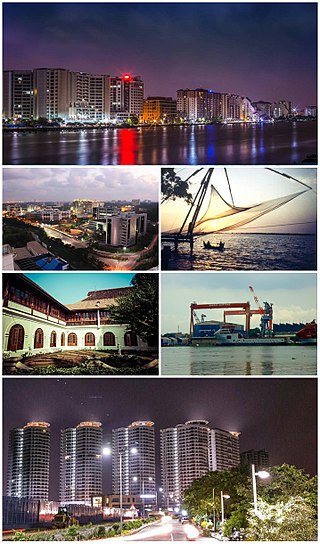
Kochi, also known by its former name Cochin, is a major port city on the Malabar Coast of India bordering the Laccadive Sea. It is part of the district of Ernakulam in the state of Kerala and is commonly referred to as Ernakulam. Kochi is the most densely populated city in Kerala. As of 2011, it has a corporation limit population of 677,381 within an area of 94.88 km2 and a total urban population of more than of 2.1 million within an area of 440 km2, making it the largest and the most populous metropolitan area in Kerala. Kochi city is also part of the Greater Cochin region and is classified as a Tier-II city by the Government of India. The civic body that governs the city is the Kochi Municipal Corporation, which was constituted in the year 1967, and the statutory bodies that oversee its development are the Greater Cochin Development Authority (GCDA) and the Goshree Islands Development Authority (GIDA). The current metropolitan limits of Kochi include the mainland Ernakulam, Fort Kochi, the suburbs of Edapally, Kalamassery, Aluva and Kakkanad to the northeast; Tripunithura to the southeast; and a group of islands closely scattered in the Vembanad Lake.

"Jana Gana Mana" is the national anthem of the Republic of India. It was originally composed as Bharoto Bhagyo Bidhata in Bengali by polymath Rabindranath Tagore on 11 December 1911. The first stanza of the song Bharoto Bhagyo Bidhata was adopted in its Hindi translation by the Constituent Assembly of India as the National Anthem on 24 January 1950. A formal rendition of the national anthem takes approximately 52 seconds. A shortened version consisting of the first and last lines is also staged occasionally. It was first publicly sung on 27 December 1911 at the Calcutta Session of the Indian National Congress.

Visakhapatnam, also known as Vizag, Viśākha or Waltair, is the largest and most populous metropolitian city in the Indian state of Andhra Pradesh. It is between the Eastern Ghats and the coast of the Bay of Bengal. It is the second-largest city on the east coast of India after Chennai, and the fourth-largest in South India. It is one of the four smart cities of Andhra Pradesh selected under the Smart Cities Mission and is the headquarters of Visakhapatnam district. With an estimated output of $43.5 billion, it is the ninth-largest contributor to India's gross domestic product as of 2016.
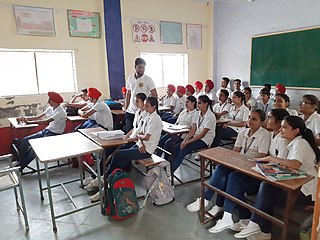
Education in India is primarily managed by the state-run public education system, which falls under the command of the government at three levels: central, state and local. Under various articles of the Indian Constitution and the Right of Children to Free and Compulsory Education Act, 2009, free and compulsory education is provided as a fundamental right to children aged 6 to 14. The approximate ratio of the total number of public schools to private schools in India is 10:3.

Manmohan Singh is an Indian politician, economist, academician and bureaucrat who served as the 13th Prime Minister of India from 2004 to 2014. He is the third longest-serving prime minister after Jawaharlal Nehru and Indira Gandhi. A member of the Indian National Congress, Singh was the first Sikh and non-Hindu prime minister of India. He was also the first prime minister since Jawaharlal Nehru to be re-elected after completing a full five-year term.

The University of Madras is a public state university in Chennai, Tamil Nadu, India. Established in 1857, it is one of the oldest and among the most prominent universities in India, incorporated by an act of the Legislative Council of India under the British government.
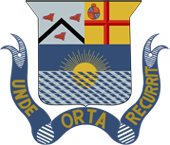
Presidency College is an art, commerce, and science college in the city of Chennai in Tamil Nadu, India. On 16 October 1840, this school was established as the Madras Preparatory School before being repurposed as a high school, and then a graduate college. The Presidency College is one of the oldest government arts colleges in India. It is one of two Presidency Colleges established by the British in India, the other being the Presidency College, Kolkata.

Gurgaon, officially named Gurugram, is a planned city and administrative headquarters of Gurugram District, located in the northern Indian state of Haryana. It is situated near the Delhi–Haryana border, about 30 kilometres (19 mi) southwest of the national capital New Delhi and 268 km (167 mi) south of Chandigarh, the state capital. It is one of the major satellite cities of Delhi and is part of the National Capital Region of India. As of 2011, Gurgaon had a population of 1,153,000.

Kerala is a state on the Malabar Coast of India. It was formed on 1 November 1956, following the passage of the States Reorganisation Act, by combining Malayalam-speaking regions of the erstwhile regions of Cochin, Malabar, South Canara, and Travancore. Spread over 38,863 km2 (15,005 sq mi), Kerala is the 21st largest Indian state by area. It is bordered by Karnataka to the north and northeast, Tamil Nadu to the east and south, and the Lakshadweep Sea to the west. With 33 million inhabitants as per the 2011 census, Kerala is the 13th-largest Indian state by population. It is divided into 14 districts with the capital being Thiruvananthapuram. Malayalam is the most widely spoken language and is also the official language of the state.
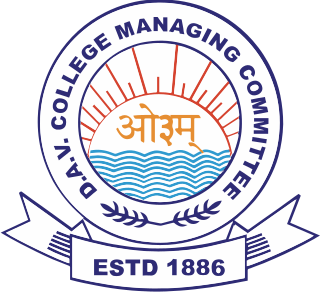
The D.A.V. College Managing Committee, familiarly known as DAVCMC, is a non-governmental educational organisation in India and overseas with over 900 schools. 75 colleges and a University. It is based on the ideals of Maharishi Dayananda Saraswati. The Dayanand Anglo-Vedic education system also comprises colleges offering graduates and post-graduates degrees in areas of study all over India.

Jawahar Navodaya Vidyalaya (JNV) is a system of central schools for talented students predominantly from rural areas in India, targeting gifted students who lack access to accelerated learning due to financial, social and rural disadvantages.

Central University of Tamil Nadu (CUTN) is a Central University located in Thiruvarur, Tamil Nadu, India, and Prof. M. Krishnan is the Vice-Chancellor of this Central University, which now has over 2,000 students in 27 Departments under 12 Schools. CUTN was ranked in the 51–100 band among universities in India by the National Institutional Ranking Framework (NIRF) in 2022.

The National Institute of Open Schooling (NIOS), formerly National Open School is a national level board of education in India, controlled and managed by the Government of India. It was established by the Ministry of Human Resource Development of the Government of India in 1989.

Goa is a state on the southwestern coast of India within the Konkan region, geographically separated from the Deccan highlands by the Western Ghats. It is bound by the Indian states of Maharashtra to the north, and Karnataka to the east and south, with the Arabian Sea in the west. It is India's smallest state by area and fourth-smallest by population. Goa has the highest GDP per capita among all Indian states, two and a half times as high as the GDP per capita of the country as a whole. The Eleventh Finance Commission of India named Goa the best-placed state because of its infrastructure, and India's National Commission on Population rated it as having the best quality of life in India. It is the third-highest ranking among Indian states in the human development index.




















